Do you enjoy working with your hands? Is finding solutions to technical problems exciting? Does post-high school training (but not traditional college courses) appeal to you?
Great news: National studies show that eight out of ten jobs require training beyond high school, but not necessarily a four-year degree. Eastern Florida State College’s Engineering Technology degree provides many excellent specializations to get your career up and running. One specialization option is Electronics, perfect for students who want to become technicians.
Natasha Johnson, a returning student, shared the importance of this program to her personal and professional goals as well as her appreciation for her instructor. “I chose this field because it is interesting and gives you a broad spectrum of what you can do when you think you can’t. It shows you what you have in you, even when you don’t see it yourself. Mr. Almeer breaks down everything and makes sure you understand from the beginning to the end. He doesn’t want anyone left behind — he wants everyone to succeed and push forward.”
A Hands-on, Transferrable Trade

In this electronics program, students learn career-related skills like manipulating, monitoring, maintaining, and working with electronic equipment, as well as manufacturing electronic components and subassemblies used in many industries. This includes everything from common electronic bench equipment and circuit theory, to the mathematics needed to understand digital and analog electronic circuits.
In class, students create engaging, hands-on projects like building functional skateboard composites, designing microchip boards, connecting wires that power robotic machines, and using water for hydraulics. The program teaches core workforce skills through practical experience. For example, students learn to troubleshoot at the component level, which applies to large machinery and cutting-edge technology used in the space and engineering industries. With the advancement of technology, troubleshooting to this level is essential for military-grade equipment.
These machines are extremely complex and expensive, and every part down to the wires must be maintained to ensure the entire mechanism is suitable for its mission. The best part? These skills transfer to a variety of industries and projects.
“Because everything today is based in electronics, you almost need an electronics degree to fix even a car,” said Meer Almeer, Professor of Engineering Technology at EFSC.
Engineering for the Next Generation

Almeer, a passionate professor with over 30 years of experience, has dedicated his career to helping students get excited about engineering technology, including electronics. A graduate of the University of Miami, Almeer has partnered with the Florida Advanced Technological Education Center (FLATE) to advance education in Florida, worked with L3Harris and Rockwell to train the employees in their facilities, and was named Post-Secondary Educator of the Year in 2007.
He is also the only IPC-certified instructor at EFSC. His teaching style is engaging and excites students about what they are learning. Using hands-on projects, he encourages students to put into practice everything they learn to prepare them for a career in the engineering technology field.
“Thirty years is a long time. I have a lot of bruises, dents, and dings, but when these guys are happy, I am happy,” added Almeer. “A student who just finished our program got a job starting at $32 an hour. That is what gives me energy.”
According to Almeer, each student finds something exciting in the curriculum. “I get students who love working with their hands; they like the soldering. Some like the composites. Others enjoy building electronics and testing them. I also have students in the digital lab who blow up chips because they connect them backward — it is interesting!”
From Classroom to Career

EFSC is among more than 20 state colleges that partnered with FLATE and the Florida Department of Education to design the statewide framework for the Engineering Technology A.S. degree, ensuring it meets industry certification standards.
The program’s first-year curriculum is standardized statewide. The second year focuses on a specialization like electronics where students develop technical skills they can apply to their career right after graduation. Successful students can immediately transition into a career in engineering technology and be an asset to any company that hires them.
“One time I was doing a workshop for NASA engineers on composites,” said Almeer. “I invited my composites class to help me. One student took the opportunity, helped a NASA manager, and got hired. Then they hired his brother. Now they are both in Hawaii, working for NASA, flying planes, and doing all kinds of interesting projects.”
Most students complete the Engineering Technology associate degree within two years. This “open access” program with rolling admissions is primarily located on the Palm Bay campus, with select courses also offered on the Cocoa campus. Courses often alternate between day and evening classes to accommodate work schedules and dual-enrolled students.
Post-Graduate Opportunities
Graduates of EFSC’s Engineering Technology program, particularly those specializing in electronics, have a wealth of career options awaiting them in various high-demand fields. With their hands-on training, they can pursue roles such as electrical and electronic equipment technicians, where they assemble, repair, and maintain vital electronic systems. Other exciting opportunities in emerging fields include working as solar photovoltaic installers or contributing to innovative projects in aerospace and robotics.
Not only does the Engineering Technology program give students a foot in the door to career growth, but it can also lead them down a career path they never thought possible. “I had a student who used to clean homes for a living,” added Almeer. “Last I heard from her, she sent me an email from Amsterdam saying she works for a company that does access control and is making a lot of money.”
The impact of EFSC’s commitment to workforce development is evident in the success stories of its graduates. From landing well-paying jobs in high-demand fields to pursuing exciting careers with industry giants like NASA, students are discovering pathways they never imagined possible. Professor Meer Almeer’s dedication to student success shines through his innovative teaching methods, fostering an environment where curiosity and creativity flourish.




